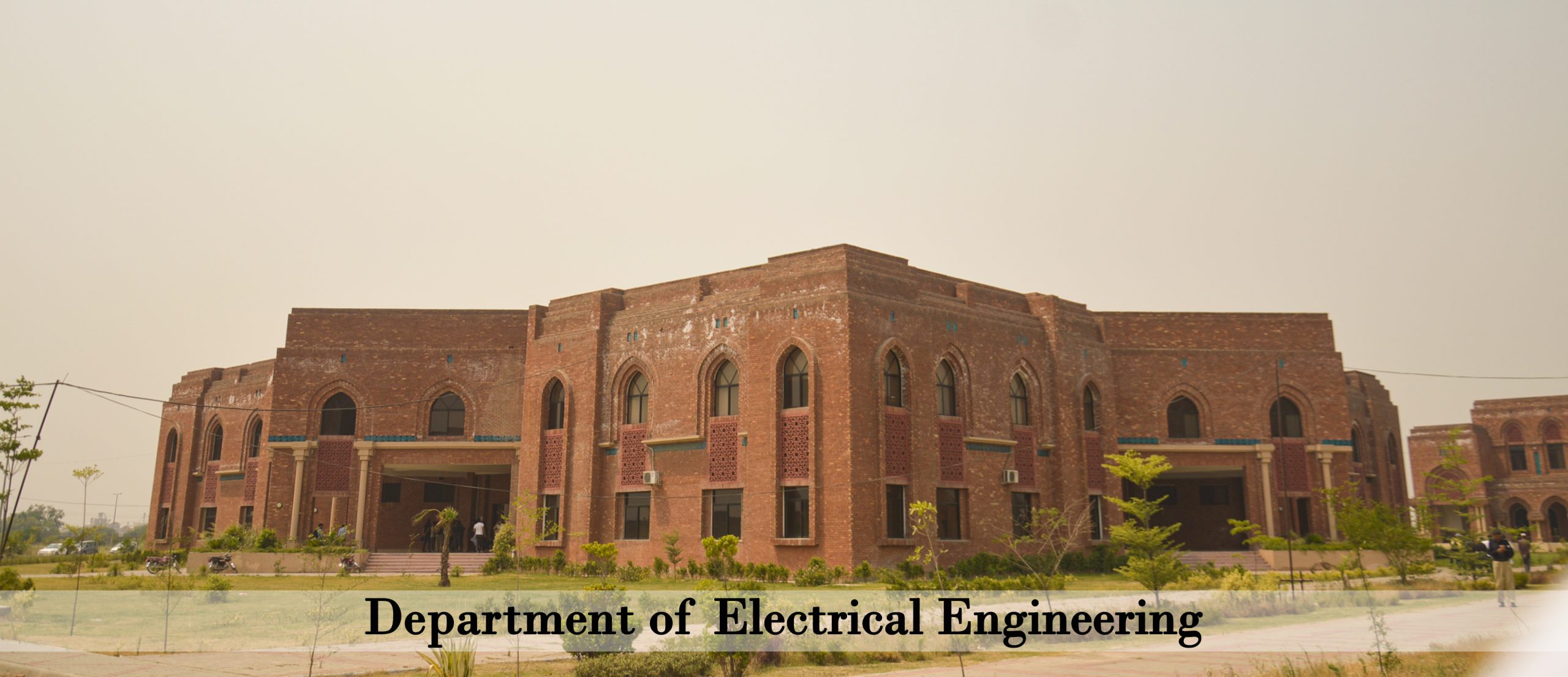The Department of Electrical Engineering, at the University of Engineering and Technology Lahore, Narowal campus is one of the most prestigious schools of learning in the field of Electrical Engineering in Pakistan. The graduates of the Department are not only able serving in Pakistan but also represent the country in various industries and academic institutions abroad. The Department aspires that its students be better prepared to handle modern-life challenges therefore it is continuously striving to improve quality of education and research. The Department was established in 2012. The undergraduate courses have been designed to build a strong foundation in various fields of Electrical Engineering. The Department has a faculty of 9 – 4 have a Ph.D. degree while 5 have a Master’s degree. The University has a firm belief in faculty development and therefore facilitates and encourages the young members to go abroad for advanced studies. Presently, one member of the faculty is pursuing advanced degrees at USA. The Department has a well-stocked and up-to-date library for the use of the faculty and students. The Department also arranges frequent seminars and workshops in various areas of electrical, electronics, computer and control system engineering. These seminars are delivered by faculty members, and prominent researchers from home and abroad.
Electrical Engineering Program Mission
To ensure understanding and application of electrical engineering fundamentals by inculcating analysis and design skills for the betterment of humanity and to become a center of excellence in the field of electrical engineering
Electrical Engineering Program Educational Outcomes (PEO’s)
PEO-1
Graduate should acquire and demonstrate their proficiency of electrical engineering knowledge by inculcating analysis and design skills using modern tools.
PEO-2
Graduate should possess the knowledge translation ability and contribute as an effective team member to reinforce their engineering competency.
PEO-3
Graduates should acquire strong moral values, ethical values, interpersonal and project management skills.
PEO-4
Graduates should build entrepreneurial and innovative mindset to address real world problems.
Electrical Engineering Program Learning Outcomes(PLO’s)
PLO1 Engineering Knowledge: An ability to apply knowledge of mathematics, science, engineering fundamentals and an engineering specialization to the solution of complex engineering problems
PLO2 Problem Analysis: An ability to identify, formulate, research literature, and analyze complex engineering problems reaching substantiated conclusions using first principles of mathematics, natural sciences and engineering sciences
PLO3 Design/Development of Solutions: An ability to design solutions for complex engineering problems and design systems, components or processes that meet specified needs with appropriate consideration for public health and safety, cultural, societal, and environmental considerations
PLO4 Investigation: An ability to investigate complex engineering problems in a methodical way including literature survey, design and conduct of experiments, analysis and interpretation of experimental data, and synthesis of information to derive valid conclusions
PLO5 Modern Tool Usage: An ability to create, select and apply appropriate techniques, resources, and modern engineering and IT tools, including prediction and modeling, to complex engineering activities, with an understanding of the limitations
PLO6 The Engineer and Society: An ability to apply reasoning informed by contextual knowledge to assess societal, health, safety, legal and cultural issues and the consequent responsibilities relevant to professional engineering practice and solution to complex engineering problems
PLO7 Environment and Sustainability: An ability to understand the impact of professional engineering solutions in societal and environmental contexts and demonstrate knowledge of and need for sustainable development
PLO8 Ethics: Apply ethical principles and commit to professional ethics and responsibilities and norms of engineering practice
PLO9 Individual and Team Work: An ability to work effectively, as an individual or in a team, on multifaceted and /or multidisciplinary settings
PLO10 Communication: An ability to communicate effectively, orally as well as in writing, on complex engineering activities with the engineering community and with society at large, such as being able to comprehend and write effective reports and design documentation, make effective presentations, and give and receive clear instructions
PLO11 Project Management: An ability to demonstrate management skills and apply engineering principles to one’s own work, as a member and/or leader in a team, to manage projects in a multidisciplinary environment
PLO12 Lifelong Learning: An ability to recognize the need for, and have the preparation and ability to engage in independent and life-long learning in the broadest context of technological change

